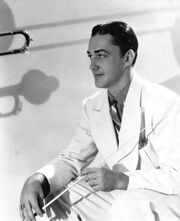
Ellis, 1938 (source: Wikipedia)
Seger Pillot Ellis (July 4, 1904 in Houston, Texas – September 29, 1995)[1] was a member of the Virginia Glee Club during the Glee Club 1921-1922 season. A first year student during the season, he was also a member of Phi Delta Theta.[2]
Ellis had a career in show business, performing as a pianist and managing artists including the Mills Brothers and Kahn and Chaplin.[3]
Career[]
Ellis began his career as pianist playing live for a local Houston radio station (later known as KPRC) in the early 1920s. In 1925 he was added to the orchestra of Lloyd Finlay for a "field trip" recording session for Victor Records and was also allowed to cut two piano solos. Although unissued for technical reasons, these solo efforts led to Ellis being invited to Victor's regular recording studio in Camden, New Jersey to cut a number of piano solos, all or most of them compositions of his own. These were among the earliest records Victor made using the new electric microphone and recording equipment, a technique that was yet not perfected which probably explains why only four of the titles were eventually issued. Of these the coupling Prairie Blues and Sentimental Blues became a minor hit.
After his first recording experiences Ellis returned to Houston and radio work as well as playing in vaudeville theaters. During this period Ellis, mainly on request of his employers at the radio station, began adding singing to his piano playing. His pleasant voice went well with the audiences and in 1927 he was invited to New York City to make vocal test recordings. His first issued vocal record was Sunday on the Columbia label. This was followed by a string of records for Okeh Records where Ellis was usually backed by small studio groups that he was allowed to pick himself. Ellis used the opportunity to select many of the best jazz musicians of the time including Tommy and Jimmy Dorsey, Joe Venuti, Eddie Lang, Andy Sannella and - on two occasions - even Louis Armstrong. On these records Ellis sang in a bittersweet alto, with which he was uncomfortable early in his career, believing his voice to be too high. Ellis was popular enough during the time he was on OKeh for them to create a special silver colored custom label for his records.
Ellis's first recording career ended in 1931. In the late 1930s however, he returned with a big band of his own, known as his "Choirs of Brass Orchestra" with himself conducting and taking occasional vocals. The band also featured his wife, Irene Taylor as a vocalist. Later in his career, Ellis focused more on songwriting, although he continued to record sporadically as well as playing the piano.
In 1939 Ellis reorganized and his new band featured the conventional four-man reed section. He disbanded in 1941 and enlisted in the Army-Air Force in 1942.[4]
After moving back to Texas he began to be less active as a performer and more involved in songwriting. Among his many compositions are "My Beloved Is Rugged" and "11:60PM" (both recorded by Harry James), "Gene's Boogie" (recorded by Gene Krupa), and "Little Jack Frost, Get Lost" and "You're All I Want for Christmas" (both recorded by Bing Crosby). "December" was recorded by Count Basie with a Mills Brothers vocal. The Seger Ellis songwriting catalog also includes "No Baby, Nobody But You" and "You Be You but Let Me Be Me". - Seger Ellis gradually retired and took up residence in Houston where he died in a retirement home on September 29, 1995.[5]
Popular compositions[]
- Freight Yard Blues
- Prairie Blues
- Sentimental Blues
- No Baby, Nobody But You
- Sweet Sue, Just You
- You Be You but Let Me Be Me
- Ain't Misbehavin' Feat. Louis Armstrong
- Cheerful Little Earful (December 1930)
- The Shivery Stomp
- My Beloved Is Rugged Feat. Harry James
- 11:60PM Feat. Harry James
- Gene's Boogie Feat. Gene Krupa
- Little Jack Frost, Get Lost Feat. Bing Crosby
- You're All I Want for Christmas Feat. Bing Crosby
- December Feat. The Mills Brothers & Count Basie
- What You Don't Know Won't Hurt You
- No Baby, Nobody But You
- You Be You but Let Me Be Me
References[]
- ↑ "Seger Pillot Ellis". Ancestry.com. http://trees.ancestry.com/tree/24120316/person/1933321161. Retrieved 2013-11-04.
- ↑ Corks and Curls. 1922. p. 49. http://books.google.com/books?id=1KRVAAAAYAAJ&dq=%22university%20of%20virginia%22%20%22glee%20club%22&pg=PA125#v=snippet&q=merrill&f=false.
- ↑ "Long and Successful Musical Career Credited to Seger Ellis". The New Hampshire (University of New Hampshire): p. 1. 1940-04-30. https://scholars.unh.edu/cgi/viewcontent.cgi?article=2247&context=tnh_archive. Retrieved 2021-04-05.
- ↑ From The Big Band Database - contributed by Mr. Robin Lenhart.
- ↑ "Seger Ellis: Forgotten Pianist and Vocalist". Keep It Swinging (blog). 2014-10-14. http://keepitswinging.blogspot.com.es/2014/10/seger-ellis-forgotten-pianist-and.html. Retrieved 2021-04-05.
| This page uses Creative Commons Licensed content from Wikipedia (view authors). |
